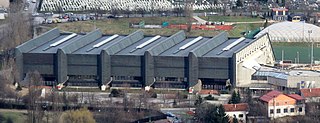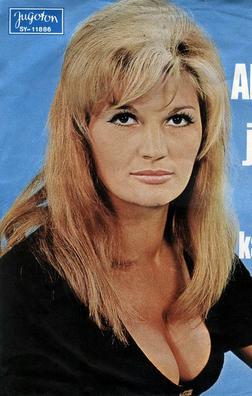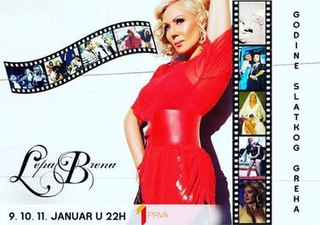
Fahreta Živojinović, known by her stage name Lepa Brena, is a Yugoslav singer, actress, and businesswoman. With around 40 million sold records, she is regarded as the commercially most successful recording artist from the former Yugoslavia. Brena is also often credited with creating the turbo-folk genre with her first two albums Čačak, Čačak (1982) and Mile voli disko (1982).

Severina Vučković, better known mononymously as Severina, is a Croatian singer-songwriter and actress. In 2006, the Croatian weekly Nacional listed her among the 100 most influential Croats, calling her "the only bona fide Croatian celebrity".

Yugoslavs or Yugoslavians is an identity that was originally conceived to refer to a united South Slavic people. It has been used in two connotations: the first in a sense of common shared ethnic descent, i.e. panethnic or supraethnic connotation for ethnic South Slavs, and the second as a term for all citizens of former Yugoslavia regardless of ethnicity. Cultural and political advocates of Yugoslav identity have historically purported the identity to be applicable to all people of South Slav heritage, including those of modern Bosnia and Herzegovina, Croatia, Montenegro, North Macedonia, Serbia, and Slovenia. Although Bulgarians are a South Slavic group as well, attempts at uniting Bulgaria with Yugoslavia were unsuccessful, and therefore Bulgarians were not included in the panethnic identification. Since the dissolution of Yugoslavia and establishment of South Slavic nation states, the term ethnic Yugoslavs has been used to refer to those who exclusively view themselves as Yugoslavs with no other ethnic self-identification, many of these being of mixed ancestry.

The Juan Antonio Samaranch Olympic Hall is an indoor multi-purpose arena in Sarajevo, Bosnia and Herzegovina. Named in honor of Juan Antonio Samaranch in 2010 after his death, it was used for various sporting events at the 1984 Winter Olympics, and as the main venue of the 2019 European Youth Olympic Winter Festival.

Silvana Bajraktarević, known professionally as Silvana Armenulić, was a Bosnian singer-songwriter and actress and one of the most prominent commercial folk music and traditional sevdalinka singers in Yugoslavia. She is called the "Queen of Sevdalinka". Her life was cut short when she died in a car crash at the age of 37, but she continues to be well regarded in the region and she is recognized for her unique singing style and voice. Armenulić's song "Šta će mi život", written by her friend and contemporary Toma Zdravković, is one of the best-selling singles from the former Yugoslavia.

Dragana Mirković is a Serbian pop-folk singer and entrepreneur. She rose to prominence in the eighties as a member of the popular collective Južni Vetar. Mirković is recognised as one of the most successful artists from the former Yugoslavia, with collective sales of 10 million records. Alongside her husband, she also founded a satellite music channel called DM SAT.

Edin Dervišhalidović, known professionally as Dino Merlin, is a Bosnian singer-songwriter and record producer. Born in Sarajevo, he was the founder and leader of Merlin, which was one of the best-selling rock bands of Southeast Europe.

Uđi slobodno... is the fifteenth studio album by pop-folk singer Lepa Brena. It was released 28 June 2008 through the record label Grand Production, after an eight-year hiatus. Marina Tucaković is the sole lyricist of five songs on the album, while the lyrics of the remaining five songs were co-written with Ljiljana Jorgovanović. The sole composer and arranger is Aleksandar Milić Mili.

Začarani krug is the sixteenth studio album by pop-folk singer Lepa Brena. It was released in presale on 20 July 2011 and for regular sale on 20 August 2011 through the record label Grand Production. The record was primarily produced by Željko Joksimović, Kiki Lesendrić, Atelje Trag, Nikša Bratoš and Dejan Abadić.

The Začarani krug Tour was a tour by Serbian singer Lepa Brena, and was staged in support of her sixteenth studio album, Začarani krug (2011). Comprising 104 shows, the tour visited Europe and North America. It began on October 20, 2011, in Belgrade, Serbia, at the Kombank Arena and concluded on September 29, 2017, in London, England at Troxy. During the tour she held the biggest concert of her career. The concert in Prilep was attended by more than 200,000 people. It was officially announced in May 2011, with dates for Balkan venues revealed. The tour was also included some festival concerts.
![<i>Hajde da se volimo</i> (film series) 1987 [[SFRY|Yugoslavia]] film](https://upload.wikimedia.org/wikipedia/en/c/ca/Hajde_da_se_volimo1.jpg)
Hajde da se volimo is a Yugoslav musical comedy film series consisting of three feature-length films released between 1987 and 1990.

Lepa Brena is a box set by Yugoslav singer Lepa Brena. It was released by Grand Production on 29 February 2016. The six-disc box set was released in Europe, and included all of Pomračenje sunca (2000), Lepa Brena (2003), Uđi slobodno... (2008), Začarani krug (2011) and Izvorne i novokomponovane narodne pesme (2013). The album artwork consisted of a collage of the album covers. This is her third compilation album.

UDIK, the Association for Social Research and Communications, is the Bosnian non-governmental organization with offices in Sarajevo and Brčko. It was founded in 2013 by Edvin Kanka Ćudić. Organization aimed to gather facts, documents, and data on genocide, war crimes, and human rights violations in Bosnia and Herzegovina and the former Yugoslavia.

Zar je važno da l' se peva ili pjeva... World Tour was the fifth headlining concert tour by Serbian singer Lepa Brena, in support of her eighteenth studio album, Zar je važno dal se peva ili pjeva (2018). The tour began on 11 November 2017, in Vienna, Austria, at the Lugner City and concluded on 28 October 2022, in Cleveland, United States, at Astor Theatre. The tour was also included some festival concerts.

Lepa Brena: Godine Slatkog greha is a 2017 documentary film about Yugoslav singer Lepa Brena. The film documents the events since the beginning of Brena's career in 1982 until the breakup of Yugoslavia in 1991.

"Zar je važno da l' se peva ili pjeva" is a song recorded by singer Lepa Brena, released on November 28, 2017 by Grand Production as the lead single from her eighteenth studio album Zar je važno dal se peva ili pjeva (2018). The song and music was written by Dragan Brajović Braja. "Zar je važno da l' se peva ili pjeva" is a folk and pop song, with lyrics Brena used to convey to those from the republics of the former Yugoslavia that hate is unnecessary. The song received excellent reviews from music critics. The music video was directed by Haris Dubica.

The Ilidža Folk Music Festival is the oldest living and premier folk music festival in the Former Yugoslavia. It is held annually in Ilidža, Sarajevo, Bosnia and Herzegovina. The festival was established in 1964 by the Association of Bosnian Recording Artists, is held in July and lasts for four days. The event hosts contemporary and traditional artists in genres under the umbrella of Folk, including Sevdalinka, Starogradska, Modern Folk, Novokomponovana, Macedonian Folk, Turbo-folk and accordion music. It has traditionally been the premier showpiece event for folk recording artists in Yugoslavia, with the two major Yugoslav record labels Jugoton and PGP-RTS releasing live LPs of each year's edition. Numerous acclaimed folk singers from the Former Yugoslavia were either signed by record labels or received wider media exposure following performances at the festival. Serbian Turbo-folk star Ceca performed at the 1988 edition when she was 15 years old and won the competition with her single Cvetak Zanovetak, while Hanka Paldum was signed by Diskoton after winning the newcomer competition in 1974.
Senida Hajdarpašić, known by her stage name Senidah, is a Slovenian singer-songwriter. Often dubbed the "Balkan Trap Diva" by the media, she was born in Ljubljana and rose to prominence as the lead singer of the band Muff. She rose to popularity across the former Yugoslavia upon the release of her solo single "Slađana" in March 2018.

Aleksandra Živojinović is a Serbian pop-folk singer. She rose to prominence after her participation in the 2013 televised singing competition Zvezde Granda, where she finished fourth. Prijović has released three albums to date, Testament (2017), Zvuk tišine (2022) and Devet života (2023). She is considered the most popular singer of the Grand Production, and one of the most popular singers in the country.

Imam pesmu da vam pevam Tour is the sixth headlining concert tour by Serbian singer Lepa Brena. It was launched to portray all of Brena’s studio albums conceptually. The tour commenced on 20 April 2024, in Sarajevo, Bosnia and Herzegovina, at the Zetra Olympic Hall.











![<i>Hajde da se volimo</i> (film series) 1987 [[SFRY|Yugoslavia]] film](https://upload.wikimedia.org/wikipedia/en/c/ca/Hajde_da_se_volimo1.jpg)







